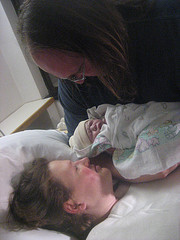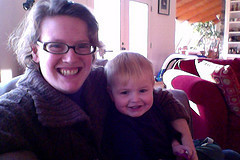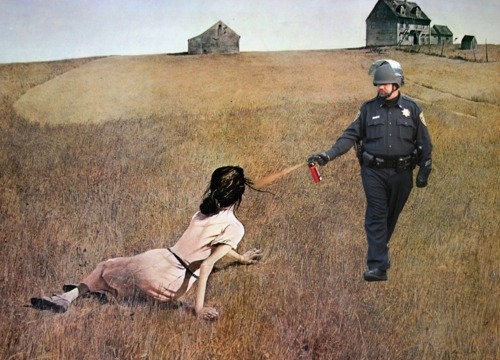Rachel Barenblat's Blog, page 236
November 30, 2011
"This is evening prayer at 5pm / as Kislev gets underway..."
EARLY MAARIV IN THE TODDLER HOUSE
This is evening prayer at 5pm
as Kislev gets underway:
a wail from my son who yearns
for a playground in the dark,
a tiny wooden train careening
around a skewed 8 of track.
Pocoyo's chirpy cartoon songs.
The red velour couch invites
limp relaxation,
an oasis of stillness.
And God is merciful
and covers over our sins,
a giraffe-patterned blanket
draped lovingly over our hearts.
This poem naturally took a fourteen-line form, though I wouldn't call it a sonnet per se. It arose out of my desire to pray the evening service (challenging at best when one is caring for a toddler) -- and my hope that when all of life is imbued with prayerful consciousness even the most mundane of actions can be prayerful.
Maariv -- Jewish evening prayer -- begins with the verse "And God is merciful, forgives iniquity, does not destroy, is quick to turn away ire, and keeps anger in check. God, save us! May our king answer us when we cry out." (That's from Psalm 78:38.) The word for "forgives" is y'chaper, יְכַפֵּר, which comes from a root which can also mean to cover-over -- hence the way the poem ends.
On increasing one's happiness
In the most recent issue of Reform Judaism magazine there's an interview with Sonja Lyubomirsky, a researcher who focuses on the possibility of permanently increasing happiness. The interview is called Happiness Rx: What Science Says, and the whole thing is worth reading -- though for me the most compelling part is the boxed inset of 11 "Happiness Boosters:"
Sonja Lyubomirsky's 11 Happiness Boosters
According to scientific research, with commitment and determined effort we can develop habits that help us achieve and maintain higher levels of happiness. Here are 11 such strategies to help you "construct" a happier life.
1. Count Your Blessings. Keep a "gratitude journal" and once a week list three to five things for which you are thankful—from the mundane (your flowers are finally in bloom) to the magnificent (your child's first steps). As much as possible, vary the kinds of blessings and how you express them. And in the process, if you name a particular person who has been kind to you or influential in your life, don't wait to express your appreciation. Write him/her a letter now, or, if possible, visit and thank the person.
2. Practice Acts of Kindness. These should be varied, and both random (let the dad with the crying baby go ahead of you at the checkout counter) and planned (read a newspaper to an elderly neighbor).
3. Nurture Optimism. Practice finding the silver lining in negative events, noticing what's right (rather than what's wrong) in a given situation, feeling good about the future (your own and the world's), or simply feeling that you can get through the day.
4. Learn to Forgive. Write—but don't send—a letter of forgiveness to a person who has hurt or wronged you. It may help you in letting go of anger, resentment, and feelings of vengeance.
5. Increase "Flow" Experiences. When you're so absorbed in what you're doing that you don't notice the passage of time, you're in a state called "flow." Try to increase the number of flow experiences in your life, whether you're completing a project at the office, playing with your children, engaging in a temple mitzvah initiative, or enjoying a hobby. Enhance flow by engaging in work and leisure activities that draw upon your skills and expertise.
6. Invest in Relationships. Having strong personal relationships is one of the major contributing factors to happiness. Put effort into healing, cultivating, and enjoying your relationships with family, friends, and fellow congregants. Act with love, be as kind to the people close to you as you are to strangers, affirm them, share with them, and play together.
7. Avoid Over-Thinking. Even during trying times, very happy people have the capacity to absorb themselves in an engaging activity. Pick a distracting, attention-grabbing activity that has compelled you in the past and do it whenever you notice yourself obsessing about the bad stuff in your life.
8. Savor Life's Joys. Pay close attention to and take delight in momentary pleasures, wonders, and magical moments. Focus on the sweetness of a ripe mango, the aroma of a fresh baked challah, the warmth of the sun when you step out from the shade. Some psychologists suggest taking "mental photographs" of pleasurable moments to review in less happy times.
9. Take Care of Your Soul. Studies show that religious and spiritual people are happier and healthier than others, perhaps because of the social support of belonging to a close-knit religious group and the sense of meaning and purpose that comes from believing in something greater than yourself. If you haven't already, join a synagogue or a community center—and become actively involved.
10. Commit to Your Goals. People who strive for something significant in their pursuits, whether it's learning a new craft or raising moral children, are far happier than those who don't have strong dreams or aspirations. Start by taking "baby steps" towards goals that help you accomplish something, nurture relationships, and feel better about yourself.
11. Use Your Body. Getting plenty of sleep, exercising, stretching, meditating, smiling, and laughing can all enhance your mood in the short term, and promote strong mental health. Practiced regularly, these energizing practices can help make daily life more satisfying and increase long-term happiness.
I'm fascinated by how many of these "happiness boosters" are integral parts of my own spiritual practice -- and of Jewish life writ large. Counting blessings, check; Jewish tradition offers the Modah Ani prayer for gratitude each morning, and also the practice of making 100 blessings each day in order to attune one to life's many blessings.
Practicing acts of kindness, check; engaging in gemilut chasadim, deeds of lovingkindness, is a central mitzvah. Nurturing optimism, check; Jewish tradition offers unending hope in the possibility of transformation for the better. Learning to forgive, check; Jewish tradition offers a practice of offering forgiveness nightly as part of the bedtime Shema, and Reb Zalman suggests a similar forgiveness exercise in his Sage-ing work.
Investing in relationships, savoring life's joys, and taking care of one's soul are also major components of Jewish life and practice. (And I would argue that even number 11 on her list, "Take care of your body," is a Jewish value -- see our blessing for going to the bathroom, which thanks God for giving us bodies which work!)
I've written before about the distinction I draw between joy and happiness. I tend to think in terms of cultivating attentiveness, mindfulness, kindness, and compassion rather than in terms of boosting pure happiness. Still, this is an interesting article -- maybe especially at this time of year, when so many different pressures often pull us away from the very practices Lyubomirsky recommends.
November 29, 2011
A call for kindness during Kislev
In Judaism, the big fall "holiday season" is the month of Elul leading up to the Days of Awe, then Sukkot and the cluster of festivals which come at its close. In mainstream American culture, the big fall "holiday season" is the shopping season which begins with great fanfare on the day after Thanksgiving and culminates at Christmas.
This can be a challenging season. Here in the northern hemisphere the days are darkening (and at the latitude of northern Berkshire, the days feel short indeed!) Thanksgiving is an opportunity for gathering with loved ones, feasting, and cultivating gratitude...though for those who are alone, the family feast day may feel even more isolating. And even for those who are blessed to gather with family, a holiday like Thanksgiving may raise or exacerbate old tensions and old hurts. On top of that, of course, some of us are introverts -- which means that concentrated togetherness-time, even if it's something we anticipate and savor, can be draining.
Over Thanksgiving weekend we entered a new month on the Jewish calendar, the lunar month of Kislev which will hold within it this year both Chanukah (which is always on the 25th of Kislev) and Christmas (which is always on the 25th of December -- except in those Christian traditions where it is on January 6 or 7 -- but regardless, it doesn't always fall during this lunar month; this year 12/25 will.) Chanukah and Christmas too offer opportunities for gathering and togetherness as well as loneliness and alienation, for celebration as well as sorrow.
For some Jews, the approach of Christmas is an enjoyable opportunity to respectfully appreciate someone else's religious traditions. For others among us, it awakens childhood memories of feeling "Other," or of yearning for the glitz and sparkle the Christian kids got to enjoy but feeling guilty for that yearning. For some of us who were reared Christian but have chosen Judaism, this month raises anxiety about how much it's "okay" to still enjoy old family traditions. For some of us who were reared Jewish but have chosen Christian spouses, the season can raise similar fears and tensions.
Here is what I have to offer: be kind to yourself during these days.
Pay attention to what your body is saying, to what your heart is saying, to the places where your mind gets tied in knots. What are the stories you tell yourself about this time of year? What are the old hurts to which you can't help returning, what are the old joys which you can't help anticipating? Listen to your body, which is your oldest and dearest companion, and be gentle to it. For me that means getting enough sleep, drinking enough water, the ritual of my little iron teapot; it means making sure I'm eating vegetables, and it also means giving myself permission to enjoy holiday sweets.
Listen to your heart. Discern what awakens joy in you, as you anticipate the month of Kislev unfolding, and what awakens sadness or fear. Tell your emotions that you understand, you hear them, they don't have to clamor for your attention. Gentle them as you would gentle a spooked horse or an overwrought child. You deserve the same attention and comfort as any beloved animal or child. GIve yourself permission to feel whatever you're feeling.
Pay attention to your social barometer. For some of us, the approach of winter's dark and cold days brings out a yearning for people, for gathering and hosting and feasting. For others, this same moment in the year wakens the desire to curl up in comfortable solitude with a book and a glass of wine or favorite episodes of a familiar tv show. (For me, both of these things are true at once! This is why I always test as both an introvert and an extrovert when I've taken the Myers-Briggs type indicator test.) Wherever you fall on that spectrum, notice it, and make the decisions which will cradle and support you.
Try not to get caught up in expectations. "What if he doesn't like his gift?" "What if I'm not spending enough?" "What if I'm spending too much?" Oy -- it's enough to tangle one's emotional and spiritual life into knots (not to mention one's neck and back muscles.) Tell yourself that whatever you bring: to the potluck, to the Chanukah or Christmas party, to your friends and family -- whatever you bring is enough. You are enough. Not just this month, but the whole year long.
November 25, 2011
Day after Thanksgiving, two years ago

How I spent the day after Thanksgiving, 2009.
Two years ago today we woke up early. My belly felt huge; I moved differently then. We called the hospital well before dawn to find out whether there was a bed available in the labor and delivery wing. And there was. So we picked up the bag we had long since packed and we drove to Berkshire Medical Center. I remember carrying our giant blue birthing ball into the hospital with me, not being sure where to put it as I sat down to fill out my intake paperwork. I remember our doula arriving. I remember the challenge of getting the IV going for the Pitocin drip.
I remember watching Daria cartoons on my laptop. I remember walking the hospital halls, pulling my IV stand alongside me. I remember our doctor -- a wonderful man -- deciding to break my waters. I remember the contractions really getting going, then. I remember a shower, some music, my husband's thumbs pressing into my back. I remember reaching the point where I couldn't ride the waves of the contractions anymore. The quiet precision of the anaesthesiologist. Apologizing to our doula once I was lying in bed, blissfully no longer in pain but worried that she might be bored now that there was nothing to do but wait.
I remember when the nurse came to examine me and then ran to fetch the doctor because it was time to push. I remember Ethan and the nurse holding my feet, I remember the doctor inviting me to look in the mirror to see the baby's head crowning -- and I remember that I shook my head no, I didn't want to open my eyes, I was somewhere too deep and too internal. All I could do was think, in my head, the words and melody of one of my favorite Jewish Renewal chants: We are opening up in sweet surrender to the luminous love-light of the One. I remember the doctor gently moving my hand so that I could feel the baby emerging.

New life.
I remember lying in bed with our infant pressed against my chest, skin to skin, with a heated blanket covering both of us. Already the adventure of labor seemed implausible. The dark still night felt like an infinite pause, rich with unimaginable possibility. I was somebody's mother now. We had created a child and I had borne him and now we were parents. I remember giving the baby to a nurse and devouring a slice of the pizza we had brought in for the staff earlier that day, suddenly ravenous. I remember going to sleep, that night, feeling that I had made it through something momentous but not sure yet what this new existence was going to mean.
Drew's birthday is early next week. He'll be two. He is beautiful and wonderful and headstrong and hilarious and so many things I never imagined. We'll celebrate him with family and friends and gifts and all the love we can bestow.
But today -- not yet his second birthday, not quite, but the day after Thanksgiving, parallel to the day I labored -- feels like a kind of anniversary for me. The anniversary of the beginning of motherhood. The anniversary of the day I spent moving through the long difficult tunnel between my last life and this new one. The day that I became something I had never been before. Thank You, God; thank you, Drew; for making me the person I am still becoming.

Me and our sweet boy.
November 24, 2011
A Thanksgiving Prayer
Thank You, God of Eternity,
for the great wonder of Your creation,
for the earth, the stars, the sun and the moon,
and the beauty of Your universe,
with which in Your great kindness You have blessed me.
Thank You for granting me life, in all its richness,
for its brilliant moments of joy
which allow me to soar as the birds,
and even for its anguish and pain,
which somehow seem to precipitate inner growth and change.
For all these things, God, I am grateful.
But thank You, especially, God, in Your abundant love,
for having chosen to make me a human being,
blessed, among all the fruits of Your creation,
with a mind to reason and seek truth and justice;
with a soul which can feel pain, ecstasy, and compassion,
and has the freedom to choose life and goodness
over cruelty and destruction;
and with a heart which can love and care,
and reach out to touch the hearts of my brothers and sisters,
as together we walk through the years of our lives.-- Reb Zalman Schachter-Shalomi, from All Breathing Life (which I reviewed back in July)
Last year at this season I shared Reb Zalman's Thanksgiving prayer, a paragraph of text recounting one version of the American Pilgrim Thanksgiving story (written in the style of, and optionally to be included in, the amidah we say during daily prayers.) This year I'm sharing one of his prayers of thanksgiving which isn't specifically for, or about, Thanksgiving Day itself. This is, I think, meant to be a daily prayer... but surely today is a fine day on which to recite it.
May we all be aware, today and every day, of the many blessings for which we can and should give thanks.
May all be fed, may all be nourished, may all be loved. To all my readers in the US, and American readers abroad, I wish a happy American Thanksgiving! And to everyone else, a happy Thursday.
November 23, 2011
Two more poems for the week of Thanksgiving: Converse and Erdrich
Harriet Maxwell Converse was born in 1836. Her father and her grandfather were both traders who had been adopted into the Seneca Nation. Her bio page at PBS tells me that in later life she became a political advocate for the Six Nations, that the Seneca Nation eventually recognized her efforts by adopting her into the Snipe Clan, and that in September of 1891 Converse became the first white woman ever condoled as a Six Nations Chief. Below, I share one of her poems, a translation of a traditional Iroquois prayer of gratitude. Among the Six Nations, giving thanks was a daily practice, not a once-a-year occurrence. I try to make thanksgiving a daily practice, too, so her rendering of this prayer speaks to me.
I also want to honor a different take on Thanksgiving. Hence the second poem in this post. Heid E. Eridrich is an Ojibwe poet whose work I first encountered when my son was an infant. (I borrowed one of her lines as inspiration for one of my mother poems.) The poem of hers which I share below is full of righteous fury. It riffs off of Robert Frost's The Gift Outright, which I have long loved -- but now that Erdrich has shown me the manifest destiny at the core of Frost's poem, his poem becomes problematized. I still love it, but I see it through different eyes.
Just so, the story of Thanksgiving. There's something in the narrative of the grateful Puritans feasting with the Wampanoag which still appeals to me; I'm moved by the idea of people coming together across their differences to break bread together and to express thanks to something beyond themselves. I learned that story when I was a child, and it still speaks to me now. But as a grown-up I have to acknowledge that narrative's biases and erasures, even as I enjoy this national festival of food and gratitude. The story of the Puritans coming to these shores is also the story of the beginning of a vast and painful paradigm shift for this country's Native peoples. I don't want to forget that, this Thanksgiving.
The Thanksgivings
by Harriet Maxwell Converse
Translated from a traditional Iroquois prayer
We who are here present thank the Great Spirit that we are here to praise Him.
We thank Him that He has created men and women, and ordered that these beings shall always be living to multiply the earth.
We thank Him for making the earth and giving these beings its products to live on.
We thank Him for the water that comes out of the earth and runs for our lands.
We thank Him for all the animals on the earth.
We thank Him for certain timbers that grow and have fluids coming from them for us all.
We thank Him for the branches of the trees that grow shadowsfor our shelter.
We thank Him for the beings that come from the west, the thunderand lightning that water the earth.
We thank Him for the light which we call our oldest brother, the sun that works for our good.
We thank Him for all the fruits that grow on the trees and vines.
We thank Him for his goodness in making the forests, and thankall its trees.
We thank Him for the darkness that gives us rest, and for the kind Being of the darkness that gives us light, the moon.
We thank Him for the bright spots in the skies that give us signs,the stars.
We give Him thanks for our supporters, who had charge of our harvests.
We give thanks that the voice of the Great Spirit can still be heard through the words of Ga-ne-o-di-o.
We thank the Great Spirit that we have the privilege of this pleasant occasion.
We give thanks for the persons who can sing the Great Spirit's music, and hope they will be privileged to continue in his faith.
We thank the Great Spirit for all the persons who perform the ceremonies on this occasion.
The Theft Outright
by Heid E. Erdrich
after Frost
We were the land's before we were.
Or the land was ours before you were a land.
Or this land was our land, it was not your land.
We were the land before we were people,
loamy roamers rising, so the stories go,
or formed of clay, spit into with breath reeking soul—
What's America, but the legend of Rock 'n' Roll?
Red rocks, blood clots bearing boys, blood sands
swimming being from women's hands, we originate,
originally, spontaneous as hemorrhage.
Un-possessing of what we still are possessed by,
possessed by what we now no more possess.
We were the land before we were people,
dreamy sunbeams where sun don't shine, so the stories go,
or pulled up a hole, clawing past ants and roots—
Dineh in documentaries scoff dna evidence off .
They landed late, but canyons spoke them home.
Nomadic Turkish horse tribes they don't know.
What's America, but the legend of Stop 'n' Go?
Could be cousins, left on the land bridge,
contrary to popular belief, that was a two-way toll.
In any case we'd claim them, give them some place to stay.Such as we were we gave most things outright
(the deed of the theft was many deeds and leases and claim stakes
and tenure disputes and moved plat markers stolen still today . . .)
We were the land before we were a people,
earthdivers, her darling mudpuppies, so the stories go,
or emerging, fully forming from flesh of earth—
Thse land, not the least vaguely, realizing in all four directions,
still storied, art-filled, fully enhanced.
Such as she is, such as she wills us to become.
November 22, 2011
New poem in Qarrtsiluni
One of my poems appears in Qarrtsiluni, as part of the special issue on Worship edited by Fiona Robyn and Kaspalita. It's called Without Ceasing, and that link will take you to the poem in both print and audio form.
Here's how it begins:
The wash of dawn across the sky
reveals your signature.
Cicadas drone your praise
through the honey-slow afternoon.
The angular windmills on the ridge
recite your name with every turn...
You can read the whole thing at the magazine; if you do so, feel free to comment there or here. As always, I'm honored to be in such fine company. Thanks, editors.
Two poems for the week of Thanksgiving: Rudolph and Weigl
Here are two poems which felt, to me, appropriate for the week of Thanksgiving -- found via the ever-wonderful Poets.org (At the Common Table: Poems for Thanksgiving). Neither of these are Thanksgiving poems per se, but they spoke to me this week; perhaps they will speak to you, too.
Little Prayer in November
by Lee Rudolph
That I am alive, I thank
no one in particular;
and yet am thankful, mostly,
although I frame no prayer
but this one: "Creator
Spirit, as you have come,
come again", even in November,
on these short days, fogbound.
Home
by Bruce Weigl
I didn't know I was grateful
for such late-autumn
bent-up cornfields
yellow in the after-harvest
sun before the
cold plow turns it all over
into never.
I didn't know
I would enter this music
that translates the world
back into dirt fields
that have always called to me
as if I were a thing
come from the dirt,
like a tuber,
or like a needful boy. End
Lonely days, I believe. End the exiled
and unraveling strangeness.
November 21, 2011
Transforming the pepper-spray cop
As I've been reading about the UC Davis police officer who sprayed pepper spray into the eyes of seated peaceful demonstrators (UC Davis pepper spray incident goes viral at the Christian Science Monitor, UC Davis pepper-spraying raises questions about role of police in the Washington Post) I've felt horror, outrage, empathy, sorrow.
But after a while, the news coverage begins to blur. The story becomes familiar, the repeated image or video clip becoming almost like wallpaper. Yes, ho-hum, we've all heard about (or read about, or maybe even watched on YouTube) the cop who attacked the protestors. The story and its attendant images become commonplace, no longer remarkable.
Enter the power of transformative works: Pepper-spray cop works his way through art history. (For more, there's now a whole pepper spraying cop tumblr.)
For me the two most powerful images in this meme are the one which speaks through, and transforms, the Sistine ceiling:
and the one which speaks through, and transforms, a painting by Andrew Wyeth:
There's something about seeing this act of police brutality transposed into these otherwise bucolic (and deeply familiar) images which highlights the act itself, and brings back my initial sense of horror. It's shocking. And again, I realize: that's right. This isn't normal. This isn't okay. This isn't the kind of police behavior we should condone, here or anywhere.
There's a delicate balance, for me, between my desire to keep my eyes open to the injustices of the world and my awareness that if I immerse too deeply in those injustices I may lose my sense of hope and my ability to be the rabbi, the mama, the partner and friend I hope to be. Still, there's something chilling for me in the realization that I can so easily become inured to stories of suffering. I don't want this kind of story to be commonplace, whether it happens in Davis or in Bahrain.
My thanks are due to the artists who created these mashups, which moved me again after the original story had ceased to register on my internal emotional scale.
On clementines, and there being nothing new under the sun
"I know what I should write about," I thought. "I just bought the year's first box of clementines." I was so excited that I ate one in the parking lot of the grocery store before driving home. I made the blessing for fruit of a tree, and recited a shehecheyanu too -- the blessing sanctifying time, which is also recited the first time one tastes something new, or the first time one tastes a beloved flavor again in a given year.
I hadn't had clementines since the tail-end of last winter, which was last year in Jewish time. The last of the clementines are always overpriced and not quite as sweet and juicy as I want them to be. The first, on the other hand -- glorious! Here in western Massachusetts our summer is full of fresh produce and seasonal delights; November, not so much. Cranberries and clementines are all that's seasonal here and now -- and neither actually comes from our soil, though they're very much the flavors of this time of year for me.
Fine, then: I would post something about my first clementine of the year. Except, when I sat down to rhapsodize about these little orange suns, I had the niggling feeling I might have made such a post before. So I looked, and found "Oh my darling..." -- written as a one-sentence blog entry in 2004, in companionship with a blog which no longer exists.
I suppose there's something comforting in recognizing that each year, as the wheel of the seasons unfolds, I find joy in the same little rituals which repeat. Though there's a bit of chagrin in recognizing that the post I wanted to make today is one I already made -- with more concision and beauty than I might have managed this morning -- seven years ago!
Rachel Barenblat's Blog
- Rachel Barenblat's profile
- 6 followers





